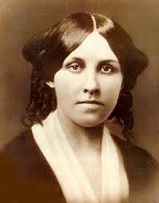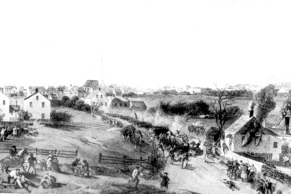About the Authors





One August, on a walk to Emerson’s house, Hawthorne took a wrong turn through the woods and ended up “tormented to death” by the bushes and underbrush along his chosen path. In the midst of this arduous journey, Hawthorne dramatically declared “ I feel as if it were almost as well to lie down and die in rage and despair, as to go one step forward.” Perhaps he should have just taken Monument Street to Lexington Ave...?
Thoreau, famed naturalist and father of American environmentalism, accidentally set fire to the woods outside of Concord while trying to cook some fish. Though he and his traveling companion, Edward Hoar, tried frantically to put it out, approximately 300 acres burned before it could be completely extinguished. Needless to say, he felt really, really bad about that.
Louisa had an especial admiration for the beauty of “wide open” eyes. As a child she once spent a day walking around Boston, having fixed her face in what she imagined a captivating, wide-eyed expression and was pleased when she noticed many intent looks in her direction. Upon returning home, she tried out her new visage in a mirror and was horrified to discover she had been parading Washington Street all day “with an insane stare upon her face.”
Emerson.....preferred to write.....at his desk......in a rocking chair......
Evidently, comfort should always come before speed!
Henry David Thoreau
(From thoreausociety.org) Henry David Thoreau was an American author, philosopher, and naturalist who was part of the Transcendentalist movement. He is best known for his "Civil Disobedience" essay, which he wrote after spending a night in jail for not paying the poll tax; and for his two-year retreat to Walden Pond, detailed in his second book, Walden, or Life in the Woods.
Thoreau may be the most quoted American author. Excerpts from his writings surface in American thought, conversation, even on t-shirts, posters and greeting cards. His words reach out to us across time and inspire us to think for ourselves.
(From Wikipedia)
Thoreau's books, articles, essays, journals, and poetry total over 20 volumes. Among his lasting contributions were his writings on natural history and philosophy, where he anticipated the methods and findings of ecology and environmental history, two sources of modern day environmentalism.
His literary style interweaves close natural observation, personal experience, pointed rhetoric, symbolic meanings, and historical lore; while displaying a poetic sensibility, philosophical austerity, and "Yankee" love of practical detail. He was also deeply interested in the idea of survival in the face of hostile elements, historical change, and natural decay; at the same time imploring one to abandon waste and illusion in order to discover life's true essential needs.
He was a lifelong abolitionist, delivering lectures that attacked the Fugitive Slave Law while praising the writings of Wendell Phillips and defending abolitionist John Brown. Thoreau's philosophy of civil disobedience influenced the political thoughts and actions of such later figures as Leo Tolstoy, Mahatma Gandhi, and Martin Luther King, Jr.
Thoreau died on May 6th, 1862 and is buried in Sleepy Hollow cemetery in Concord.
Read more about Thoreau:
Louisa May Alcott
(From louisamayalcott.org) Louisa May Alcott was born in Germantown, Pennsylvania on November 29, 1832. She and her three sisters, Anna, Elizabeth, and May, were educated by their father, philosopher/ teacher Bronson Alcott, and raised on the practical Christianity of their mother, Abigail May.
Louisa spent her childhood in Boston and in Concord, Massachusetts, where her days were enlightened by visits to Ralph Waldo Emerson’s library, excursions into nature with Henry David Thoreau, and theatricals in the barn at "Hillside" (now Hawthorne’s "Wayside").
When Louisa was 35 years old, her publisher in Boston, Thomas Niles, asked her to write "a book for girls." Little Women was written at Orchard House from May to July 1868. The novel is based on Louisa and her sisters’ coming of age and is set in Civil War New England. "Jo March" was the first American juvenile heroine to act from her own individuality -- a living, breathing person rather than the idealized stereotype then prevalent in children’s fiction.
In all, Louisa published over 30 books and collections of stories. She died on March 6, 1888, only two days after her father, and is buried in Sleepy Hollow Cemetery in Concord.
More about Louisa May Alcott:
The Louisa May Alcott official homepage
Nathaniel Hawthorne
(From Wikipedia) Nathaniel Hawthorne, (born Nathaniel Hathorne; July 4, 1804) was an American novelist and short story writer.
Born in Salem, Massachusetts to Nathaniel Hathorne and Elizabeth Clarke Manning Hathorne, his ancestors include John Hathorne, a judge during the Salem Witch Trials. Nathaniel later added a "w" to make his name "Hawthorne".
Hawthorne anonymously published his first work, a novel titled Fanshawe, in 1828. He published several short stories in various periodicals which he collected in 1837 as Twice-Told Tales. The next year, he became engaged to Sophia Peabody. He worked at a Custom House and joined Brook Farm, a transcendentalist community, before marrying Peabody in 1842. The couple moved to The Old Manse in Concord, Massachusetts, later moving to Salem, the Berkshires, then to The Wayside in Concord.
The Scarlet Letter was published in 1850, followed by a succession of other novels. A political appointment took Hawthorne and family to Europe before their return to The Wayside in 1860.
Much of Hawthorne's writing centers around New England, many works featuring moral allegories with a Puritan inspiration. His fiction works are considered part of the Romantic movement and, more specifically, dark romanticism. His themes often center on the inherent evil and sin of humanity, and his works often have moral messages and deep psychological complexity. His published works include novels, short stories, and a biography of his friend Franklin Pierce. Hawthorne died on May 19, 1864, and is buried in Sleepy Hollow Cemetery in Concord.
More about Nathaniel Hawthorne:
Wikipedia - Nathaniel Hawthorne
Ralph Waldo Emerson
(From Wikipedia) Ralph Waldo Emerson (May 25, 1803) was an American lecturer, essayist, and poet, best remembered for leading the Transcendentalist movement of the mid-19th century. He was seen as a champion of individualism and a prescient critic of the countervailing pressures of society, and he disseminated his thoughts through dozens of published essays and more than 1,500 public lectures across the United States.
Emerson gradually moved away from the religious and social beliefs of his contemporaries, formulating and expressing the philosophy of Transcendentalism in his 1836 essay, Nature. Following this ground-breaking work, he gave a speech entitled The American Scholar in 1837, which Oliver Wendell Holmes, Sr. considered to be America's "Intellectual Declaration of Independence". Considered one of the great lecturers of the time, Emerson had an enthusiasm and respect for his audience that enraptured crowds.
Emerson wrote most of his important essays as lectures first, then revised them for print. His first two collections of essays – Essays: First Series and Essays: Second Series, published respectively in 1841 and 1844 – represent the core of his thinking, and include such well-known essays as Self-Reliance, The Over-Soul, Circles, The Poet and Experience. Together with Nature, these essays made the decade from the mid-1830s to the mid-1840s Emerson's most fertile period.
Emerson died on April 27th, 1882 and is buried in Sleepy Hollow cemetery in Concord.
Learn more about Ralph Waldo Emerson:

©Copyright 2011 Gatepost Tours, LLC
A few interesting and lesser known details about our authors...
A little irreverent. A lot of fun.
Read more about our amazing authors and the lives they lived here in Concord, MA!







